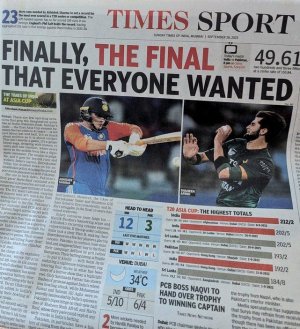For its matches against Pakistan in the current Asia Cup in UAE, the BCCI has adopted what has been called a "invisible boycott" strategy. On Sunday, September 28, at the Dubai International Cricket Stadium, India and Pakistan will face off in the continental competition finale. Reports state that BCCI would stick to their "invisible boycott" strategy as no board representative will be present at the venue to grace the meeting.
This boycott approach was initially considered prior to India vs Pakistan in Group A. Because of the continuous animosity between the two nations, the BCCI chose to keep high office-bearers away from cameras rather than completely cancel the match.
The absence of BCCI officials looks like a direct response to public sentiment. In recent weeks, several fan groups across India have amplified boycott campaigns, urging the board not to lend symbolic support to the contest.
This stance marks a sharp contrast to earlier this year, when the same venue hosted an India-Pakistan clash in the Champions Trophy. On that occasion, the stands were filled not only with fans but also with a large contingent of BCCI dignitaries and state association heads. Their absence this time underscores the weight of the current political climate.
India and Pakistan have faced off in two Asia Cup matches so far in this edition. In their Group A clash, Salman Agha's team lost to the Men in Blue by 7 wickets. When the two sides faced off again in the Super Fours, India won by a margin of 6 wickets.
Suryakumar Yadav has guided the young Indian team admirably despite not scoring many runs throughout the event. With three half-centuries in six games, Abhishek Sharma has been India's standout player.
Kuldeep Yadav has been excellent with the ball with 13 wickets at an average of 9.85 in six games. Both players have won two Player of the Match awards each as India have maintained a perfect record in the tournament so far.
we all understand that majboori… Money .. Money
Rest all excuses , BS and acting like not shaking hands






















